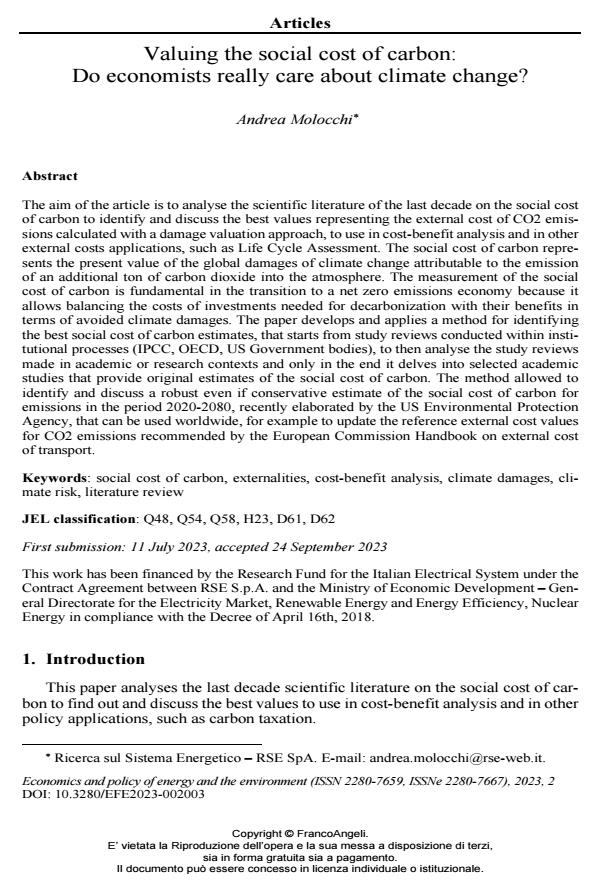Valuing the social cost of carbon: Do economists really care about climate change?
Titolo Rivista ECONOMICS AND POLICY OF ENERGY AND THE ENVIRONMENT
Autori/Curatori Andrea Molocchi
Anno di pubblicazione 2023 Fascicolo 2023/2
Lingua Inglese Numero pagine 36 P. 41-76 Dimensione file 459 KB
DOI 10.3280/EFE2023-002003
Il DOI è il codice a barre della proprietà intellettuale: per saperne di più
clicca qui
Qui sotto puoi vedere in anteprima la prima pagina di questo articolo.
Se questo articolo ti interessa, lo puoi acquistare (e scaricare in formato pdf) seguendo le facili indicazioni per acquistare il download credit. Acquista Download Credits per scaricare questo Articolo in formato PDF

FrancoAngeli è membro della Publishers International Linking Association, Inc (PILA)associazione indipendente e non profit per facilitare (attraverso i servizi tecnologici implementati da CrossRef.org) l’accesso degli studiosi ai contenuti digitali nelle pubblicazioni professionali e scientifiche
The aim of the article is to analyse the scientific literature of the last decade on the social cost of carbon to identify and discuss the best values representing the external cost of CO2 emis-sions calculated with a damage valuation approach, to use in cost-benefit analysis and in other external costs applications, such as Life Cycle Assessment. The social cost of carbon repre-sents the present value of the global damages of climate change attributable to the emission of an additional ton of carbon dioxide into the atmosphere. The measurement of the social cost of carbon is fundamental in the transition to a net zero emissions economy because it allows bal-ancing the costs of investments needed for decarbonization with their benefits in terms of avoided climate damages. The paper develops and applies a method for identifying the best social cost of carbon estimates, that starts from study reviews conducted within institutional processes (IPCC, OECD, US Government bodies), to then analyse the study reviews made in academic or research contexts and only in the end it delves into selected academic studies that provide original estimates of the social cost of carbon. The method allowed to identify and dis-cuss a robust even if conservative estimate of the social cost of carbon for emissions in the period 2020-2080, recently elaborated by the US Environmental Protection Agency, that can be used worldwide, for example to update the reference external cost values for CO2 emis-sions recommended by the European Commission Handbook on external cost of transport.
Parole chiave:social cost of carbon, externalities, cost-benefit analysis, climate damages, climate risk, literature review
Jel codes:Q48, Q54, Q58, H23, D61, D62
- Social Cost of Carbon as an International Benchmark to Drive Countries’ Carbon Pricing during the Transition Andrea Molocchi, Giulio Mela, in Sustainability /2024 pp.8573
DOI: 10.3390/su16198573
Andrea Molocchi, Valuing the social cost of carbon: Do economists really care about climate change? in "ECONOMICS AND POLICY OF ENERGY AND THE ENVIRONMENT" 2/2023, pp 41-76, DOI: 10.3280/EFE2023-002003